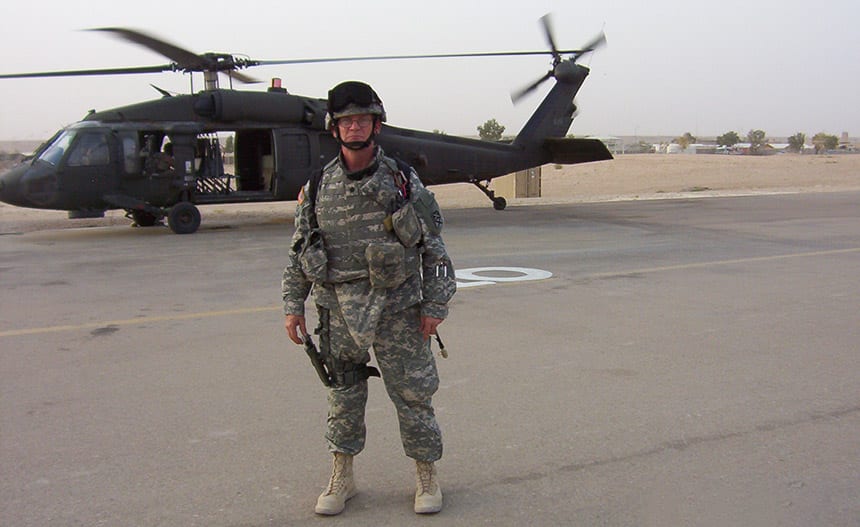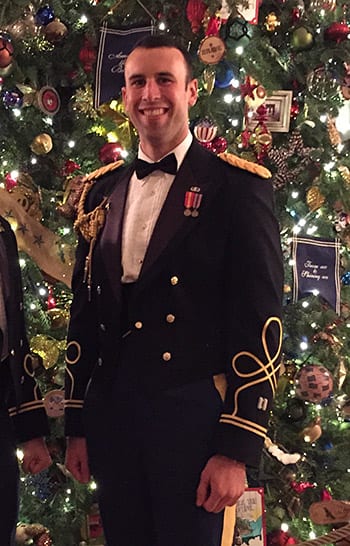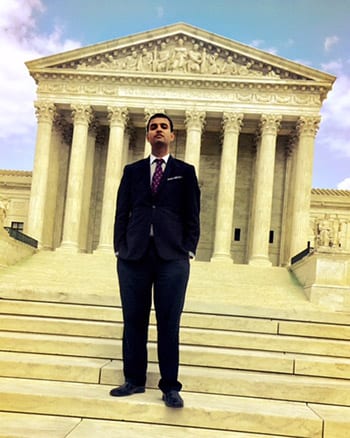
By Susan Gluss
Retired Alabama National Guard Lt. Col. Roger Yearwood tells his story in a slow southern drawl that belies a steely resolve.
Set to retire from the military in 2009, he volunteered one last time to lead a U.S. Army battalion in Iraq. It was his third and final deployment.
Stationed in Baghdad in 2010, he cut his right hand while cleaning his revolver. Two days later on patrol, he shared a meal with local tribal leaders. The next day, he developed a mass on the right side of his chest, a high fever, and pain and weakness in his arm.
Yearwood was evacuated to Germany and flown to Walter Reed Army Hospital in Washington, D.C. where he was diagnosed with a severe staph infection. It was triggered by the cut on his hand or contaminated food.
“When you’re a commander … you don’t want to leave your soldiers,” Yearwood said. “That’s the last thing you want to do. But I was sick; I had no choice. It was either that or die.”
He didn’t realize it at the time, but the injury was just the start of a years-long battle with the army that would eventually involve students in Berkeley Law’s Veterans Law Practicum. For Yearwood and the students, the case exemplified the striking challenge faced by wounded military veterans seeking medical benefits.
Yearwood underwent two major surgeries and two months of outpatient care. During that latter period, his wife helped him bathe, dress, and swathe his wounds.
It was a long and painful recovery. But when Yearwood applied for an insurance payment at the Dept. of Veterans Affairs, that’s when the real battle began.
Although Yearwood met all the disability criteria under the military’s Traumatic Injury Protection Program, the V.A. refused his request for $25,000 compensation—an amount guaranteed under the plan. Undeterred, Yearwood appealed, but the agency denied his claim again.
Financially strapped and lacking counsel, he searched for legal help. Finally, in 2011, he was referred to the Veterans Law Practicum.
The Berkeley Law squad
Current and former law students who worked on the case reacted to it with outrage and disbelief.
“I was appalled at what seemed to be a deliberate and unjust effort by the military to keep Mr. Yearwood and other similarly situated servicemen from obtaining their hard-earned benefits,” said Brianna Kohr ’14. The military’s actions “just added insult to injury.”

Hamilton Jordan ’13 was “surprised and confused” by the explanations offered in the army’s rejection letters. “The government seemed never to deal fairly and squarely with all of the arguments and evidence Lt. Col. Yearwood had presented over the long course of the case.”
The students rolled up their sleeves and got to work. Daniel Bilotti ’12, enrolled in the practicum for four semesters, took the lead.
“Having a military background, I was the point of contact with Col. Yearwood, his family, and the other military personnel,” he said. “We worked to develop the record to show that a ‘traumatic event’ had occurred and that infection was a direct result. This involved interviews, drafting statements, and weeding through the administrative record to build our case.”
Bilotti and his teammates talked to medical experts and soldiers, conducted legal research on military benefits, and studied administrative appeal procedures. They wrote internal memos and drafted portions of Yearwood’s filings.
“The case was particularly challenging,” John Pyun ’15 wrote in an email, because much of the work required “pointing out the logical inconsistencies in the military’s arguments, rather than simply citing cases.”
The team exhausted all possible administrative appeals, to no avail. So the practicum found a pro bono attorney who could file the case in federal district court: former U.S. Assistant Attorney Frank James, a 30-year military veteran.
“When I served on active duty … the army took care of its own,” James said. “I couldn’t imagine how the army would turn down Colonel Yearwood’s request. … If there was any question, he should have received the benefit of the doubt.”
Students worked closely with James on the federal case. Although the judge ruled in Yearwood’s favor—the army appealed.
“I was even more outraged when I saw that,” James said. “I just couldn’t understand why the army would take that track. It’s not the army that I knew. But we filed a brief in opposition.”
The students wrote the first draft brief, and, along with James, Yearwood and his family, waited for the court’s ruling. Finally, in March of this year, the court issued its final judgment—for Yearwood. The army let it stand.
All told, it took six years, five teams of students and four appeals.

“No matter how challenging any part of the process became for us, the challenges overcome by—and the sacrifices made by—Col. Yearwood … were infinitely greater,” said Dr. R. Sohan Dasgupta ’16.
Wounded warriors
When Yearwood first filed, the backlog of claims older than 125 days at the V.A. was about 500,000 and the claims inventory nearly 800,000. Under fire, the agency began to expedite its claims. But a new report finds that tens of thousands of Middle East veterans who left the military are being refused benefits at the highest rate since the system was created at the end of World War II.
The agency’s procedures are so complicated and confusing that having the “gravitas” of a law school or an attorney can be critical, said Katherine McGrath ’12.
Her teammate Jordan said “The Yearwood case taught me that a winning argument is not always enough. If you’re seeking relief through a system that’s ill-equipped to process all claims on its docket in a fair and careful manner, you can’t be certain that your grievance—no matter how viable—will get the attention it deserves.”
In cases that take years of appeals, it could be very easy “to throw in the towel,” he added.
That’s exactly what Yearwood wants to prevent. “There are young men and young women trying to collect on different claims, and I just want to encourage them not to take ‘no’ for an answer,” he said.
The practicum’s supervising attorney, Professor John Yoo, said the case sets “an appropriate standard that should make it much easier for returning veterans to prove that they’ve been injured while on military service.”
A few weeks ago, Yearwood’s army records were corrected, and he received a payment of $25,000. “I just can’t put into words how my wife and I appreciate the tremendous job” the students performed, he said.
Yearwood intends to give some of the proceeds to a permanent memorial for wounded warriors.